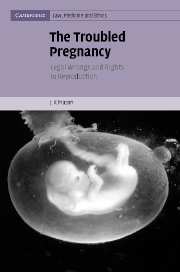Book contents
- Frontmatter
- Contents
- Preface
- Table of cases
- Table of statutes
- 1 The nature of the troubled pregnancy
- 2 Voluntary and involuntary termination of pregnancy
- 3 Antenatal care and the action for wrongful birth
- 4 Unsuccessful sterilisation
- 5 Uncovenanted pregnancy and disability
- 6 Wrongful neonatal life
- 7 The management of the disabled neonate
- 8 Conclusion
- Bibliography
- Index
2 - Voluntary and involuntary termination of pregnancy
Published online by Cambridge University Press: 19 July 2009
- Frontmatter
- Contents
- Preface
- Table of cases
- Table of statutes
- 1 The nature of the troubled pregnancy
- 2 Voluntary and involuntary termination of pregnancy
- 3 Antenatal care and the action for wrongful birth
- 4 Unsuccessful sterilisation
- 5 Uncovenanted pregnancy and disability
- 6 Wrongful neonatal life
- 7 The management of the disabled neonate
- 8 Conclusion
- Bibliography
- Index
Summary
Introduction
One cannot help feeling that the topic of abortion has been argued for so long and with such intensity that there can be nothing new left to say – and this leads to some doubt as to the value of a chapter on the subject in this book. Nevertheless, it is one that still arouses intense emotions and there are few people who, when challenged, will not express strong opinions on the ethical and sociological expedience of voluntary termination of pregnancy. As a result, personal attitudes tend to be polarised. We can, however, say, with a sense of relief, that the abortion issue leads to less conflict in the United Kingdom than it does in many other parts of the world. But this is not because we have adopted a middle view – indeed, it is doubtful if it is possible to do so. Rather, there is a sense of war-weariness accompanied by something of a tacit agreement to stop fighting about it, an attitude that helps to explain the paucity of case law that abortion, per se, has spawned in this country. Even so, strongly held views that are suppressed are dormant, not deceased. They can be aroused whenever a new situation arises and, given the intense activity in the field of reproduction that is so much a feature of modern medical innovation, relevant new questions are likely to arise at any time – as is evidenced by the flurry of intellectual and parliamentary activity, albeit at an unofficial level, which arose in early 2006, particularly in relation to late terminations.
- Type
- Chapter
- Information
- The Troubled PregnancyLegal Wrongs and Rights in Reproduction, pp. 14 - 52Publisher: Cambridge University PressPrint publication year: 2007



